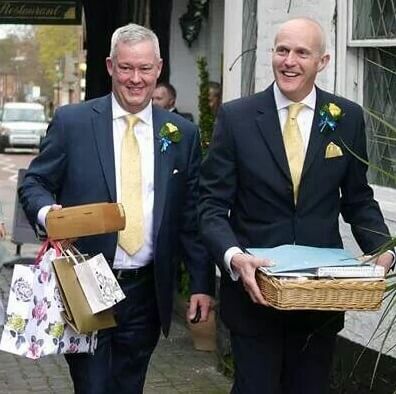Gay clergyman Jeremy Pemberton loses discrimination appeal against Church of England
A gay clergyman has lost his appeal against the Church of England after he claimed its attitude to same-sex marriage breached equality laws.
Canon Jeremy Pemberton's case was thrown out by the Court of Appeal this morning. It upheld a previous ruling that he was not discriminated against when he was stopped from taking up a position as a hospital chaplain after marrying his partner.

Pemberton was barred in 2014 by the then bishop of Southwell and Nottingham, Richard Inwood, from taking up a job with the NHS in Nottinghamshire shortly. It came shortly after he became the first Church of England priest to enter into a same-sex marriage with his partner Laurence Cunnington.
The Church of England has an exemption under equality laws that allow it to discriminate on the basis of sexuality if it contravenes their teaching.
Pemberton said while he was 'naturally disapointed with the judgment' he had reached a settlement with the Church and would not be taking the case further.
'The Church of England has established through this process that it can continue to discriminate legally against some LGBT people in relation to their employment, even where that employment is not within the boundaries of the Church's jurisdiction,' he said in a statement today.
'This will seem to most people in the UK today an extraordinary result, and not one that will help commend the claims of Christ to the nation.
'An official position that regards the loves and commitments of LGBT people, including clergy, as sinful by definition is years overdue for thorough-going revision. The need for a revolution in attitudes and practices in the Church towards this minority is still acute – we continue to wait for real change.'
He added that he hoped to be allowed to return to ministry at some point.
'Finally, I owe most to Laurence Cunnington. He has been rock-like and constant in his support and love in this, as in all things. We look forward to celebrating our fourth wedding anniversary soon. I cannot thank him enough for the honour he does me in being my husband,' he said.
The appeal judge said: 'I have no difficulty understanding how profoundly upsetting Canon Pemberton must find the Church of England's official stance on same-sex marriage and its impact on him.
'But it does not follow that it was reasonable for him to regard his dignity as violated, or an 'intimidating, hostile, degrading, humiliating or offensive' environment as having been created for him, by the Church applying its sincerely-held beliefs in a way expressly permitted by Schedule 9 of the (Equality) Act.
'If you belong to an institution with known, and lawful, rules, it implies no violation of dignity, and it is not cause for reasonable offence, that those rules should be applied to you - however wrong you may believe them to be.
'Not all opposition of interests is hostile or offensive.'
Commenting on today's judgment, a Southwell and Nottingham diocesan spokesperson said: 'We are pleased that the court has upheld the decision made with regards to the employment tribunal. We recognise that this has been a long and difficult process for many of those concerned, and we hold them in our thoughts and prayers.'
The case was seen as significant test of the CofE doctrine against equality legislation because it questioned whether the church could legitimately veto appointments by other bodies – in this instance, the NHS.
Inwood revoked Pemberton's permission to officiate as an Anglican cleric, meaning he could not up a job at King's Mill hospital in Mansfield, Nottinghamshire, even though he was to be employed by the NHS, not the Church.
Inwood argued at the time that, according to CofE doctrine, marriage could only be between a man and a woman.
In the previous employment tribunal ruling, Pemberton 'was aware his marriage would be seen in conflict with the teachings of the church (even if he did not accept the characterisation of those teachings as doctrine) and he would thus be viewed as not in "good standing", as would be understood within the Church of England'.
It went on to say 'the claimant would never have been in this position had he not defied the doctrine of the church. The claimant knowingly entered into that marriage and knew what the potential consequences could be for him.
'In getting married to his partner, he was flying in the face of the clear restating of doctrine in relation to same-sex marriage.'
The Court of Appeal judgement is yet to be published.











